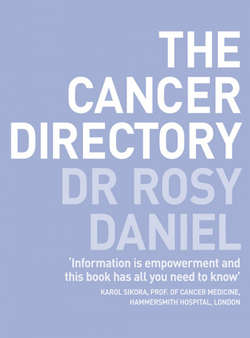Читать книгу The Cancer Directory - Dr. Daniel Rosy - Страница 44
Dealing with shock
ОглавлениеThe diagnosis (or re-diagnosis) of cancer can put you into severe emotional and physical shock. Extreme shock is an odd thing. You may feel that you are able to cope but, in fact, your thinking and reaction times may be severely impaired. If you do receive bad news when you are not expecting it, it is safer to wait at the hospital or surgery until someone can come and pick you up. It is certainly better not to attempt to drive or go out onto public transport while you are in such a state and feeling so vulnerable.
It is estimated that in a state of shock, less than one-tenth of what you are told is retained. Because of this, the most important thing to remember is to never make important decisions while you are in a state of shock! Yet, medical personnel may rush straight from telling you your diagnosis and prognosis to explaining your treatment options.
The sense of urgency created by doctors at the time of diagnosis is usually exaggerated. Yes, it is a good idea to move ahead with appropriate treatment for cancer as soon as possible after diagnosis, but the treatment will be far harder to cope with – and may even be less effective – if you are in a state of shock and fear, and feeling out of control. There is clear evidence that being well prepared psychologically, with a positive attitude towards treatment, conveys not only psychological and quality-of-life benefits, but also a distinct survival advantage.
It is therefore highly advisable to take the time you need to:
• go through your emotional reaction to the diagnosis
• think about what seems the best treatment option for you (and this may even be having no treatment)
• prepare yourself mentally, physically and practically for treatment, before it starts.
